新概念英语第二册第二课课文详解
裕兴新概念英语第二册笔记_第2课_课文讲解
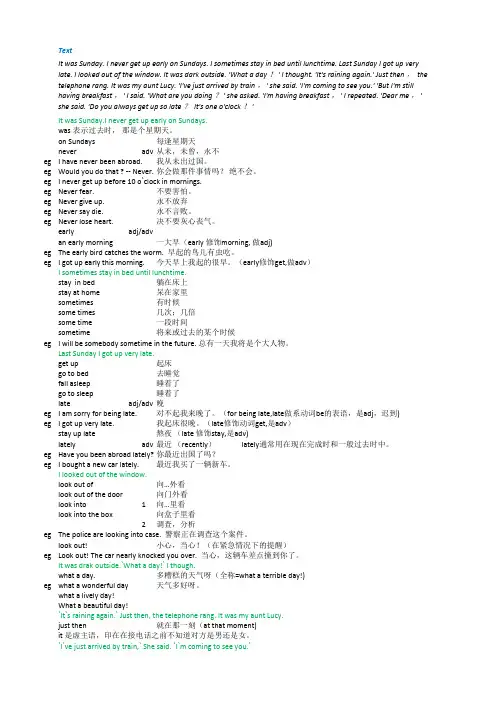
TextIt was Sunday. I never get up early on Sundays. I sometimes stay in bed until lunchtime. Last Sunday I got up very late. I looked out of the window. It was dark outside. 'What a day!' I thought. 'It's raining again.' Just then, the telephone rang. It was my aunt Lucy. 'I've just arrived by train,' she said. 'I'm coming to see you.' 'But I'm still having breakfast,' I said. 'What are you doing?' she asked. 'I'm having breakfast,' I repeated. 'Dear me,' she said. 'Do you always get up so late? It's one o'clock!'It was Sunday.I never get up early on Sundays.was 表示过去时,那是个星期天。
on Sundays每逢星期天never adv从未,未曾,永不eg I have never been abroad.我从未出过国。
eg Would you do that ? -- Never.你会做那件事情吗?绝不会。
eg I never get up before 10 o`clock in mornings.eg Never fear.不要害怕。
新概念英语第二册课后习题答案详解(96课全)复习课程

新概念英语第二册课后习题答案详解(96课全)新概念英语第二册课后习题答案详解Lesson 31. c根据课文可以判断出作者不喜欢写明信片,但他很想收到别人寄来的明信片,所以应该选c.d. doesn’t like postcards 不喜欢明信片,和课文的含义不符合,所以不选d.2. a根据课文最后两句话可以判断出:作者作出的“一项重大决定”是给他的朋友们写明信片,可是还是一张没有写成,所以应该选a.3. ca. at 表示在小的地点和空间;b. to 表示方向;d. on 表示在……上;只有c. in 表示在大的空间和地方,如城市国家等,所以选c.4. a只有选a. Who taught ,这句问话才与回答相配。
5. d只有选d. in a friendly way(以友好的方式)才能说明前一句He was a friendly waiter,也合乎语法和逻辑。
而其他3个 a. friend(朋友), b. as friends(作为朋友),c. like friends(像朋友一样)在语法上都讲不通。
6. b本句的时态是一般过去时,应该用动词的过去式形式;a. reads 是第3人称蛋单数现在时形式;c. red 词意思不符合;d. reading 是现在分词形式;b. read 过去式和现在式形式相同,发音不同。
所以只有选b.7. ca. the hole 词意思不对;b. the ball 和 d. all of 不合乎习惯用法;英语中不用the all day, all of day 这样一来的短语。
只有选c. all 才能使句中的词组all day 同前一句中的the whole day 意思相同。
8. c句中的waiter 是“饭店服务员”的意思,他通常在饭店工作,而不在a. public garden(公园),b. shop(商店),d. private house(私宅) 工作,所以选c. restaurant.9. b只有b. borrowed 才与前一句中的lent相对应,而其他3个选择都不是。
新概念英语第二册课文详解
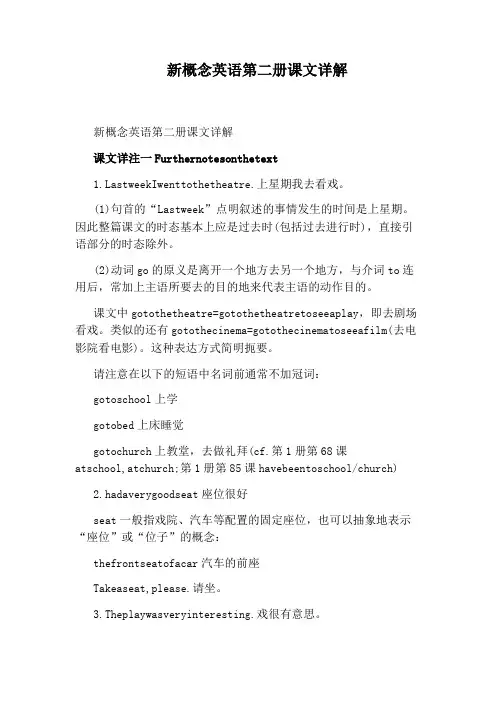
新概念英语第二册课文详解新概念英语第二册课文详解课文详注一FurthernotesonthetextstweekIwenttothetheatre.上星期我去看戏。
(1)句首的“Lastweek”点明叙述的事情发生的时间是上星期。
因此整篇课文的时态基本上应是过去时(包括过去进行时),直接引语部分的时态除外。
(2)动词go的原义是离开一个地方去另一个地方,与介词to连用后,常加上主语所要去的目的地来代表主语的动作目的。
课文中gotothetheatre=gotothetheatretoseeaplay,即去剧场看戏。
类似的还有gotothecinema=gotothecinematoseeafilm(去电影院看电影)。
这种表达方式简明扼要。
请注意在以下的短语中名词前通常不加冠词:gotoschool上学gotobed上床睡觉gotochurch上教堂,去做礼拜(cf.第1册第68课atschool,atchurch;第1册第85课havebeentoschool/church)2.hadaverygoodseat座位很好seat一般指戏院、汽车等配置的固定座位,也可以抽象地表示“座位”或“位子”的概念:thefrontseatofacar汽车的前座Takeaseat,please.请坐。
3.Theplaywasveryinteresting.戏很有意思。
interesting属于现在分词形式的形容词,意思是“使人感兴趣”。
它通常与非人称主语连用或修饰某个事物:Thisisaninterestingbook/idea.这是一本有趣的书/一个令人感兴趣的主意。
4.…weresittingbehindme.Theyweretalkingloudly.……坐在我的身后,大声地说着话。
这两句的时态为过去进行时。
(cf.第7课语法)5.Igotveryangry.我变得非常生气。
get在这里有“逐渐变得”的含义,接近become,是个表示过程的动词,表示状态的变化。
新概念第二册课后答案详解
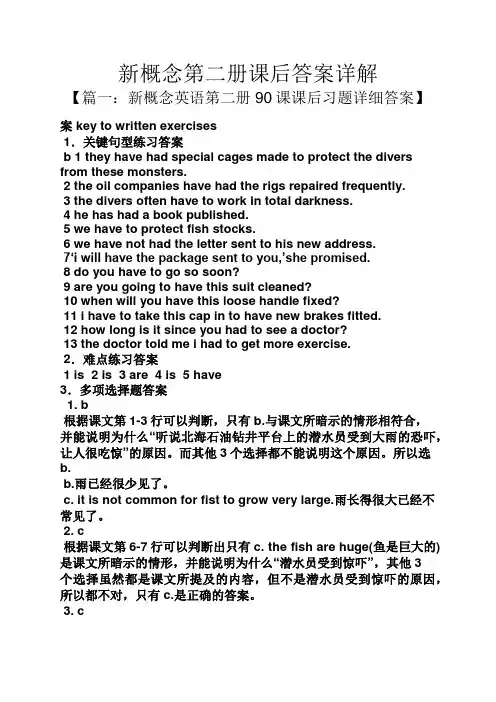
11 i have to take this cap in to have new brakes fitted.
12 how long is it since you had to see a doctor?
10. d
本句需要选一个同前一句中的词组unnatural sizes (出奇得大)含义相同的形容词,才能使它与前一句意义保持一致。a. expensive (昂贵的);b. overfished (对鱼类过量捕捞的);c. lovely (可爱的);d. huge (巨大的)中,只有d. huge与unnatural sizes含义相同,所以选d.
6 we have not had the letter sent to his new address.
7‘i will have the package sent to you,’she promised.
8 do you have to go so soon?
9 are you going to have this suit cleaned?
8.ba. chair(椅子),c. armchair(手扶椅) d. class(班级)这3个选择都和seat的意思不符合。seat是”座位,座席”的意思。强调的是可供坐下的地方,不是具体的椅子。只有b. place是seat的同义词。
9.ab. big(大的)指体积;c. tall(高的)指身材;d. large(大的)指空间和面积。
nephew才能准确说明他们的关系。11. da. food(食品),b. dinner(正餐),c. lunch(午餐)这3个词都不能同breakfast划等号。只有d.a meal(一顿饭)可以等同于breakfast,所以应该选d.
新概念英语第二册课文知识点详解
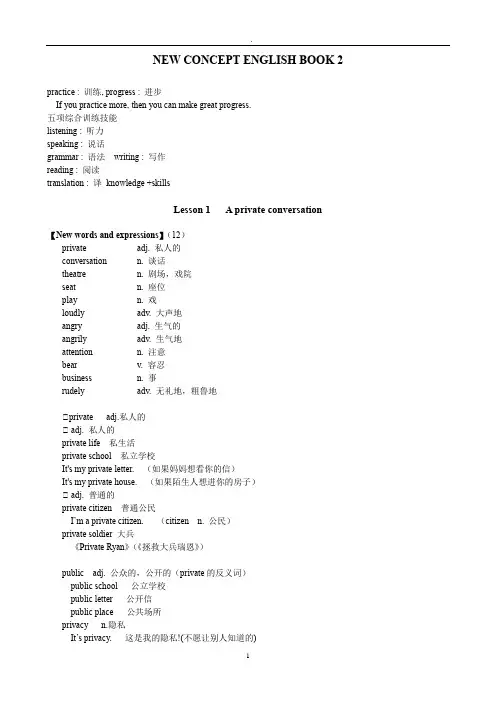
NEW CONCEPT ENGLISH BOOK 2practice : 训练, progress : 进步If you practice more, then you can make great progress.五项综合训练技能listening : 听力speaking : 说话grammar : 语法writing : 写作reading : 阅读translation : 译knowledge +skillsLesson 1 A private conversation【New words and expressions】(12)private adj. 私人的conversation n. 谈话theatre n. 剧场,戏院seat n. 座位play n. 戏loudly adv. 大声地angry adj. 生气的angrily adv. 生气地attention n. 注意bear v. 容忍business n. 事rudely adv. 无礼地,粗鲁地★private adj.私人的★ adj. 私人的private life 私生活private school 私立学校It's my private letter. (如果妈妈想看你的信)It's my private house. (如果陌生人想进你的房子)★ adj. 普通的private citizen 普通公民I’m a private citizen. (citizen n. 公民)private soldier 大兵《Private Ryan》(《拯救大兵瑞恩》)public adj. 公众的,公开的(private的反义词)public school 公立学校public letter 公开信public place 公共场所privacy n.隐私It’s privacy. 这是我的隐私!(不愿让别人知道的)★conversation n.谈话have a + talk/chat/dialogue/conversation/gossip 名词变动词conversation 一般用于正式文体中, 内容上往往不正式subject of conversation 话题They are having a conversation.talk 内容可正式可不正式, 也可以私人Let’s have a talk.dialogue 对话, 可以指正式国家与国家会谈China and Korea are having a dialogue.chat 闲聊,就是北京人说的“侃”,说的是无关紧要的事。
新概念英语第二册课文:Toolate为时太晚
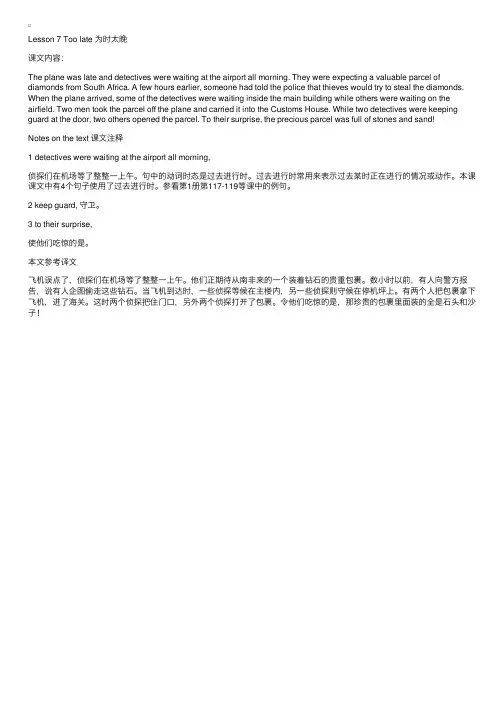
Lesson 7 Too late 为时太晚课⽂内容:The plane was late and detectives were waiting at the airport all morning. They were expecting a valuable parcel of diamonds from South Africa. A few hours earlier, someone had told the police that thieves would try to steal the diamonds. When the plane arrived, some of the detectives were waiting inside the main building while others were waiting on the airfield. Two men took the parcel off the plane and carried it into the Customs House. While two detectives were keeping guard at the door, two others opened the parcel. To their surprise, the precious parcel was full of stones and sand!Notes on the text 课⽂注释1 detectives were waiting at the airport all morning,侦探们在机场等了整整⼀上午。
句中的动词时态是过去进⾏时。
过去进⾏时常⽤来表⽰过去某时正在进⾏的情况或动作。
本课课⽂中有4个句⼦使⽤了过去进⾏时。
参看第1册第117-119等课中的例句。
2 keep guard, 守卫。
3 to their surprise,使他们吃惊的是。
新概念英语第二册第02课
Lesson 2 - Breakfast or lunch?TextIt was Sunday.I never get up early on Sundays.I sometimes stay in bed until st Sunday,I got up very late.I looked out of the window.It was dark outside."What a day!"I thought.It's raining again.Just then,the telephone rang.It was my aunt Lucy."I've just arrived by train."she said."I'm coming to see you.""But I'm still having breakfast."I said."What are you doing?"She asked."I'm having breakfast."I repeated."Dear me!"She said."Do you always get up so late?It's one o'clock."New words and expressions 生词和短语until prep. 直到outside adv. 外面ring v. (铃、电话等)响aunt n. 姑,姨,婶,舅母repeat v. 重复Note on the text 课文注释1 on Sundays, 指每个星期日。
星期几的前面用介词on。
2 What a day! 多么糟糕的天气!这是一个省略的感叹句。
完整的句子应该是Whata day it is!英语中的感叹句常用what开头,后面紧跟一个名词或名词性短语(包括连系动词),然后是主语和谓语,句尾用感叹号。
新概念英语第二册:第2课课文详解及语法解析
【导语】学习新概念英语并不难啊。
你还在为英语成绩低拖后腿⽽烦恼吗?不要着急,⽆忧考⼩编为⼤家提供了“新概念英语第⼆册:第2课课⽂详解及语法解析”。
相信加⼊学习当中的你,很快便不再受英语的困扰!还在等什么?和⼩编⼀起来学习吧! 课⽂详注 Further notes on the text 1.It was Sunday. 那是个星期天。
在句⼦中,我们常常⽤it指时间、天⽓、温度或距离。
这种it有时被称为“虚主语” (empty subject),因为它没有实际意义。
它之所以存在,是因为英语句⼦必须包含主语和谓语。
请注意以下例句: 表⽰时间: It is 8 o'clock. 8点了。
表⽰天⽓: It's raining again. ⼜下⾬了。
It is cold. 天⽓冷。
表⽰环境: It was dark outside. 外⾯⼀⽚漆⿊。
作为第3⼈称单数的中性代词,it可以指⼀件东西、⼀个事件或者⽤来指是什么⼈: It was my aunt Lucy. 是我姑母露西。
(打来电话者) It is a lovely baby. 真是个可爱的⼩宝宝。
2.on Sundays 在星期天的时侯 (1)复数形式指每个星期⽇,或⼤部分星期⽇,与⼀般现在时连⽤,表⽰经常性的⾏为: We do not go to school on Sundays. 星期天我们不上学。
I never get up early on Sundays. 星期天我从来不早起。
(2)介词on⼀般⽤于表⽰某⼀天的时间短语中: on Monday 星期⼀ on Friday 星期五 on Monday morning 在星期⼀早上 on that day 在那⼀天 当我们使⽤last, next和this, that时,介词(以及定冠词)必须省略: I'll see you next/this Friday. 下个/这个星期五再见。
新概念英语第二册课后习题答案详解(96课全)
新概念英语第二册课后习题答案详解Lesson 31. c根据课文可以判断出作者不喜欢写明信片,但他很想收到别人寄来的明信片,所以应该选c.d. doesn’t like postcards 不喜欢明信片,和课文的含义不符合,所以不选d.2. a根据课文最后两句话可以判断出:作者作出的“一项重大决定”是给他的朋友们写明信片,可是还是一张没有写成,所以应该选a.3. ca. at 表示在小的地点和空间;b. to 表示方向;d. on 表示在……上;只有c. in 表示在大的空间和地方,如城市国家等,所以选c.4. a只有选a. Who taught ,这句问话才与回答相配。
5. d只有选d. in a friendly way(以友好的方式)才能说明前一句He was a friendly waiter,也合乎语法和逻辑。
而其他3个 a. friend(朋友), b. as friends(作为朋友),c. like friends(像朋友一样)在语法上都讲不通。
6. b本句的时态是一般过去时,应该用动词的过去式形式;a. reads 是第3人称蛋单数现在时形式;c. red 词意思不符合;d. reading 是现在分词形式;b. read 过去式和现在式形式相同,发音不同。
所以只有选b.7. ca. the hole 词意思不对;b. the ball 和 d. all of 不合乎习惯用法;英语中不用the all day, all of day 这样一来的短语。
只有选c. all 才能使句中的词组all day 同前一句中的the whole day 意思相同。
8. c句中的waiter 是“饭店服务员”的意思,他通常在饭店工作,而不在a. public garden(公园),b. shop(商店),d. private house(私宅) 工作,所以选c. restaurant.9. b只有b. borrowed 才与前一句中的lent相对应,而其他3个选择都不是。
新概念英语第二册课后练习题答案详解(第2课)
新概念英语第二册课后练习题答案详解(第2课)新概念英语第二册课后习题Lesson 21. c因为根据课文内容,作者正在吃早饭,他不可能在床上。
所以a. 和b.与课文内容不符合,作者强调即使他起床很晚,已经是中午,但他还在吃早饭,所以d.也不对。
2. d因为只有d.才是Aunt Lucy 感到惊讶的原因,其他3个选择都不合乎逻辑。
3. c本句有一个表示经常性动作的时间状语sometimes,所以要用一般现在时。
因为主语是He, 所以它后面的动词要在词尾加s.a. stay 词尾没有加s;b. is staying 是实行时;d. staying是现在分词;只有c. stays符合时态和人称。
4. cgo to bed 是固定词组,意思是“就寝”。
a. in 能够用在stay in bed 之中;b. into 和 d. at 不符合语法和习惯用法,英语中不用into bed, at bed 这样的短语。
5. a只有a. late 是前一句中early的反义词,意思是“迟,晚”。
而 b. lately(最近), c. slowly(慢) , d. hardly(几乎不)都不是early的反义词。
6. b此问句的回答是By train ,是表示方式的,意思是乘火车来的。
只有b. How才能对句子中表示方式的部分实行提问。
而a. When是就时间提问的; c. Why是就原因提问的;d. where 是就地点提问的。
7. b如果填a. still句子不符合语法规则,也不符合逻辑; 选c. often 和 d. always 也不符合逻辑。
只有填b. now 句子才符合逻辑:他现在不能见他姑妈,因为他正在吃早饭。
8. a4个选择都有看的意思。
Look 的词意思是“看,望”强调看的动作,常和介词at, outof 等连用;See 的词意思是“看到,见到”强调结构,后面要带宾语;Watch的词意思是“观看,注视”多用来指看戏剧,电视节目等,是及物动词,如watch TV, watch a play;Remark 的词意思是“注意到,觉察到”也强调结果。
- 1、下载文档前请自行甄别文档内容的完整性,平台不提供额外的编辑、内容补充、找答案等附加服务。
- 2、"仅部分预览"的文档,不可在线预览部分如存在完整性等问题,可反馈申请退款(可完整预览的文档不适用该条件!)。
- 3、如文档侵犯您的权益,请联系客服反馈,我们会尽快为您处理(人工客服工作时间:9:00-18:30)。
新概念英语第二册第二课课文详解
【知识点讲解】
1 get up [短语] (使)起床
get up 还有①起身、站起(相当于stand up);②(海浪、风等)增强、变猛烈的意思。
例句:Everyone get up when the manager came in.
当经理走进来时每个人都站立起来了。
2 sometimes 有时候
文章中间 never从不; sometimes有时; always总是;是表示频率的词语,类似这样的词语还有:often 常常、usually 、 rarely
极少;frequently时常往往;ever永远, 老是, 始终;once一次等
等这类的词语需要大家平时收集。
sometime,sometimes,some time,some times用法区别
sometime
(1)副词:某个时候。
可指过去或将来的某个时候。
(2)形容词:(指某人以前是……)从前的,过去的,意思类
似former,偶尔的。
例句:We'll take our holiday sometime in August.
我们会在八月找个时间度假。
(将来)
This is our sometime general manager.
这是我们的前任总经理。
(过去)
sometimes 副词:有时候。
另外,at times也是"有时"的意思。
例句:Sometimes, I recall the campus life.
有时候,我会回想起大学生活。
some time 某段时间。
常与for连用。
例句:I will stay here for some time.
我将在这儿待一段时间。
some times 几次。
several times也能够表示"几次",但比some times较确定。
time作可数名词时可作"次数"解;表示"时间"时是不可数名词。
例句:He has been to America some times.
他去过几次美国。
3 outside adv. 在外面;向外面,也可表示在户外。
例句:I am cleaning the house, please wait outside for several minutes.
我正在打扫屋子,请在外等几分钟。
4 on sundays,指每个星期日。
星期几的前面要用介词on。
例句:I usually go hiking on Friday.
我通常在星期五去远足。
on Sundays Sunday后面加了s,意思就是每逢周日。
5 What a day!
多么糟糕的天气!这是一个省略的感叹句。
完整的句子应该是What a day it is!英语中的感叹句常用what开头,后面紧跟一个名词或名词性短语(包括连系动词),然后是主语和谓语,句尾用感叹号,即其基本形式是:What+(a)名词+主谓结构。
使用what感叹句时
要注意:如果what后面是可数名词单数,则一定要加不定冠词。
what
后面的名词词组不能加定冠词。
例句:What a happy day we had yesterday!
昨天真是开心的一天!
What bad news it was!
真是个坏消息!
还有一种是用how引导的感叹句,结构是:How+adj.形容词(adv.副词)+主语+谓语+(it is).How hot the day is ! 多么热的
天气呀!How bad the weather is! 多么糟糕的天气呀!
6 I'm coming to see you.
在这句话中,是用现在实行时表示近期计划或安排将要实行的动作。
具有这种语法功能的词仅限于过渡性动词,比如:come,go,leave,start,arrive,return等。
例句:My aunt is coming tonight.
我姨妈今晚要来。
7、文章中还有最常见的look用法,像文中look out向外望的
这种词组最容易考单选和完形填空,大家可要记准啦。
与look相关的
词组有:
look after照看, 照管
look ahead 向前看; 注意! 当心!
look at看, 查看考虑, 着眼于(第一课里面我们有遇到哦:I looked at the man and the woman angrily.)。
